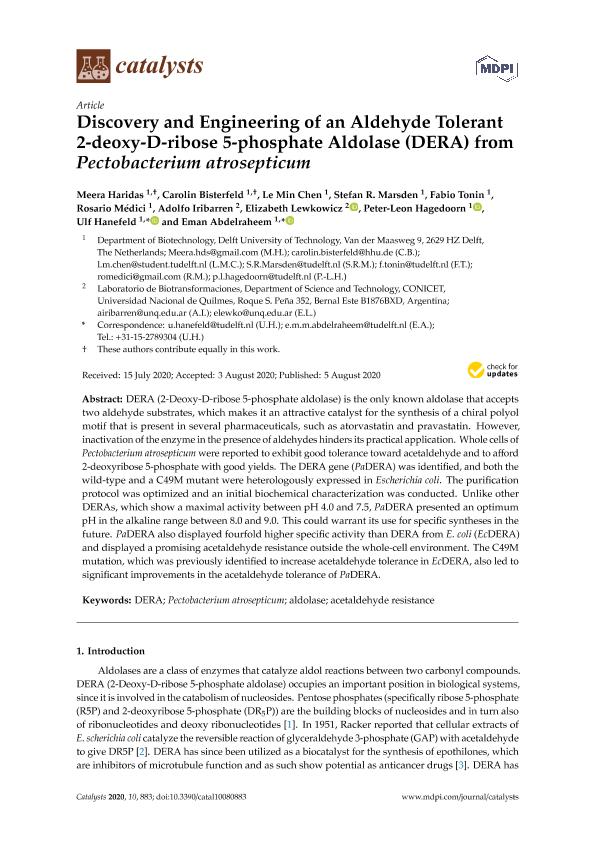Artículo
Discovery and engineering of an aldehyde tolerant 2-deoxy-d-ribose 5-phosphate aldolase (Dera) from pectobacterium atrosepticum
Haridas, Meera; Bisterfeld, Carolin; Chen, Le Min; Marsden, Stefan R.; Tonin, Fabio; Médici, Rosario; Iribarren, Adolfo Marcelo ; Lewkowicz, Elizabeth Sandra
; Lewkowicz, Elizabeth Sandra ; Hagedoorn, Peter-Leon; Hanefeld, Ulf; Abdelraheem, Eman
; Hagedoorn, Peter-Leon; Hanefeld, Ulf; Abdelraheem, Eman
 ; Lewkowicz, Elizabeth Sandra
; Lewkowicz, Elizabeth Sandra ; Hagedoorn, Peter-Leon; Hanefeld, Ulf; Abdelraheem, Eman
; Hagedoorn, Peter-Leon; Hanefeld, Ulf; Abdelraheem, Eman
Fecha de publicación:
08/2020
Editorial:
MDPI
Revista:
Catalysts
ISSN:
2073-4344
Idioma:
Inglés
Tipo de recurso:
Artículo publicado
Clasificación temática:
Resumen
DERA (2-Deoxy-D-ribose 5-phosphate aldolase) is the only known aldolase that accepts two aldehyde substrates, which makes it an attractive catalyst for the synthesis of a chiral polyol motif that is present in several pharmaceuticals, such as atorvastatin and pravastatin. However, inactivation of the enzyme in the presence of aldehydes hinders its practical application. Whole cells of Pectobacterium atrosepticum were reported to exhibit good tolerance toward acetaldehyde and to afford 2-deoxyribose 5-phosphate with good yields. The DERA gene (PaDERA) was identified, and both the wild-type and a C49M mutant were heterologously expressed in Escherichia coli. The purification protocol was optimized and an initial biochemical characterization was conducted. Unlike other DERAs, which show a maximal activity between pH 4.0 and 7.5, PaDERA presented an optimum pH in the alkaline range between 8.0 and 9.0. This could warrant its use for specific syntheses in the future. PaDERA also displayed fourfold higher specific activity than DERA from E. coli (EcDERA) and displayed a promising acetaldehyde resistance outside the whole-cell environment. The C49M mutation, which was previously identified to increase acetaldehyde tolerance in EcDERA, also led to significant improvements in the acetaldehyde tolerance of PaDERA.
Palabras clave:
ACETALDEHYDE RESISTANCE
,
ALDOLASE
,
DERA
,
PECTOBACTERIUM ATROSEPTICUM
Archivos asociados
Licencia
Identificadores
Colecciones
Articulos(SEDE CENTRAL)
Articulos de SEDE CENTRAL
Articulos de SEDE CENTRAL
Citación
Haridas, Meera; Bisterfeld, Carolin; Chen, Le Min; Marsden, Stefan R.; Tonin, Fabio; et al.; Discovery and engineering of an aldehyde tolerant 2-deoxy-d-ribose 5-phosphate aldolase (Dera) from pectobacterium atrosepticum; MDPI; Catalysts; 10; 8; 8-2020; 1-10
Compartir
Altmétricas



